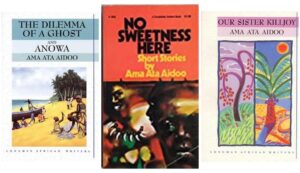Tributes have continued to pour in for Ata Aidoo, Ghana’s foremost author who died in the early hours of Wednesday, May 31, 2023 in Accra, Ghana.
The family of the author announced her demise in a statement, saying, “our beloved relative and writer” passed away after a short illness.” They requested privacy to allow them to grieve.
President Nana Akufo Addo of Ghana said in a series of tweets on June 2, “I heard of the news of the death of Ama Ata Aidoo with sadness and sorrow. I extend deepest sympathies and condolences to her children and family on their great loss.
“She was my contemporary at the University of Ghana, someone with whom I enjoyed friendly and productive relations. Ama Ata Aidoo was a big Ghanaian, and one of the outstanding writers of her generation.
“Through her work, she made a tremendous contribution to the development of our country and continent, and expressed so many of our feelings about our fate as Ghanaians and, indeed, as Africans.
“We will miss her; the continent and the world will miss her. She had a reach that was beyond Ghana. May her soul rest in perfect peace until the Last Day of the Resurrection when we shall all meet again. Amen!”

The Pan African Writers Association (PAWA) described as shocking the passing of the renowned Ghanaian poet and author.
In a condelence letter signed by PAWA’S President, Hon John Rusimbi, and the Secretary-General, Dr Wale Okediran, the association commiserated with the family of the deceased, the government and people of the Republic of Ghana, as well as African writers at large on this irreparable loss.
PAWA said it recalled “with nostalgia and gratitude the immense contributions of the late Ama Ata Aidoo to African literature, governance, tertiary education and women emancipation.”
Christina Ama Ata Aidoo was born on March 23, 1942, in the small village of Abeadzi Kyiakor, near Saltpond in the central Fanti-speaking region of the then Gold Coast (now Ghana).
Her father had opened the first school in the village and was a strong influence on her.
At the age of 15 she decided that she wanted to be a writer and, within just four years, had achieved that ambition after she was encouraged to enter a competition.
“I won a short story competition but learned about it only when I opened the newspaper that had organised it, and saw the story had been published on its centre pages and realised the name of the author of that story in print was mine,” Ata Aidoo once said as she looked back at her career.
“I believe these moments were crucial for me because … I had articulated a dream… it was a major affirmation for me as a writer, to see my name in print.”
She went on to study literature at the University of Ghana and became a lecturer, publishing her first play in 1964.
She was a prolific writer whose work emphasised the paradoxical position of the modern African woman.
Aidoo began to write seriously while an honours student at the University of Ghana, where she obtained a Bachelor of Arts in 1964.
She won early recognition with a problem play, The Dilemma of a Ghost (1965), in which a Ghanaian student returning home brings his African-American wife into the traditional culture and the extended family that he now finds restrictive.
Their dilemma reflects Aidoo’s characteristic concern with the “been-to” (African educated abroad), voiced again in her semiautobiographical experimental first novel, Our Sister Killjoy or Reflections from a Black-Eyed Squint (1966).
After her 18 month-foray into politics she went into self-imposed exile in Zimbabwe for a time and became a full-time writer.
Aidoo won a fellowship to Stanford University in California, returned to teach at Cape Coast, Ghana (1970–82), and subsequently accepted various visiting professorships in the United States and Kenya.
In No Sweetness Here (1970), a collection of short stories, she exercised the oral element of storytelling, writing tales that are meant to be read aloud. These stories and Anowa (1970), another problem play, are concerned with Western influences on the role of women and on the individual in a communal society. Aidoo rejected the argument that Western education emancipates African women.
She further exposed exploitation of women who, as unacknowledged heads of households when war or unemployment leaves them husbandless, must support their children alone.
In 1982–83 she served as Ghana’s minister of education.
Aidoo published little between 1970 and 1985, when Someone Talking to Sometime, a collection of poetry, appeared.
Her later titles include The Eagle and the Chickens (1986; a collection of children’s stories), Birds and Other Poems (1987), the novel Changes: A Love Story (1991), An Angry Letter in January and Other Poems (1992), The Girl Who Can and Other Stories (1997), and Diplomatic Pounds and Other Stories (2012).
In 1992 she won the Commonwealth Writers Prize for Best Book in Africa, for her novel Changes: A Love Story, about a career-oriented woman as she divorces her first husband and navigates a new relationship.
She was also honoured with the prestigious Ghanatta Award for Literature, for her achievement in Ghanaian and African literature in 2018.
Reflecting her beliefs as a writer, she opposed what she described as a “Western perception that the African female is a downtrodden wretch”.
When asked by BBC HARDTalk’s Zeinab Badawi in 2014 if she regarded herself as a writer with a mission, she replied: “In retrospect, I suppose I could describe myself as a writer with a mission. But I never was aware that I had a mission when I started to write.
“People sometimes question me, for instance, why are your women so strong? And I say, that is the only woman I know.”
In a tribute, Egyptian-American writer and journalist Mona Eltahawy said on Twitter: “So sad to hear that author Ama Ata Aidoo has passed. An inspiration to feminists everywhere, especially us African feminists.”
Zimbabwean author and activist Tsitsi Dangarembga said on Twitter: “We have lost a granary of wisdom & knowledge.”





